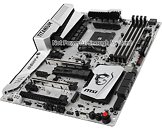Monday, April 15th 2019

MSI Betrays AMD's Socket AM4 Longevity Promise: No Zen2 for 300-series?
Greedy motherboard vendors such as MSI want you to buy a new motherboard every two generations of processor for no sound reason at all. MSI is reportedly blocking support for 3rd generation Ryzen "Matisse" processors on its AMD 300-series chipset motherboards, including those based on high-end AMD X370 and OC-capable B350 chipsets. This would also put those who own $300 motherboards such as the X370 XPower out of luck. To recap, AMD announced on numerous occasions that it doesn't want to be a greedy clique like its competitor, by forcing motherboard upgrades and promised that socket AM4 motherboards will be backwards and forwards compatible with at least four generations of Ryzen processors, running all the way up to 2020.
This normally should mean that any 300-series motherboard must support 4th generation Ryzen processors with a simple BIOS update. Most 300-series motherboards, including from MSI, even ship with USB BIOS Flashback feature to help with forwards compatibility. Unfortunately, motherboard companies such as MSI care more about their bottom-lines than the consumer. In a support e-mail to an X370 XPower Titanium owner, MSI confirmed that it will not extend Zen 2 support to AMD 300-series. Other motherboard vendors could follow MSI's suit as a representative of another motherboard vendor, on condition of anonymity, told TechPowerUp that "Zen 2" processors have steeper electrical requirements that 300-series motherboards don't meet. This is an excuse similar to the one Intel gave for the planned obsolescence of its 100-series and 200-series chipsets, even as it was repeatedly proven that those motherboards can run and overclock 9th generation processors with custom firmware just fine. Would MSI care to explain whether a B450M PRO-M2 has a stronger VRM than an X370 XPower Titanium to warrant "Zen 2" support? Will all "Zen 2" processor SKUs have steep electrical requirements? Will there not be any SKUs with double-digit-Watt TDP ratings?Update (16/04): MSI posted a clarification on this issue.
Source:
master3553 (Reddit)
This normally should mean that any 300-series motherboard must support 4th generation Ryzen processors with a simple BIOS update. Most 300-series motherboards, including from MSI, even ship with USB BIOS Flashback feature to help with forwards compatibility. Unfortunately, motherboard companies such as MSI care more about their bottom-lines than the consumer. In a support e-mail to an X370 XPower Titanium owner, MSI confirmed that it will not extend Zen 2 support to AMD 300-series. Other motherboard vendors could follow MSI's suit as a representative of another motherboard vendor, on condition of anonymity, told TechPowerUp that "Zen 2" processors have steeper electrical requirements that 300-series motherboards don't meet. This is an excuse similar to the one Intel gave for the planned obsolescence of its 100-series and 200-series chipsets, even as it was repeatedly proven that those motherboards can run and overclock 9th generation processors with custom firmware just fine. Would MSI care to explain whether a B450M PRO-M2 has a stronger VRM than an X370 XPower Titanium to warrant "Zen 2" support? Will all "Zen 2" processor SKUs have steep electrical requirements? Will there not be any SKUs with double-digit-Watt TDP ratings?Update (16/04): MSI posted a clarification on this issue.


335 Comments on MSI Betrays AMD's Socket AM4 Longevity Promise: No Zen2 for 300-series?
For better part of a decade 90-95% of x86 PC owners were totally fine with new sockets coming every 2 years. This means there's a big enough group that should be OK with MSI decision (even if it was pure greed, which seems not to be the case).
MSI should have no problem keeping their market share - they'll just focus on a more profitable client group who buy stuff more often. This is what all companies do. You're never after all possible consumers. You're "giving" the worst to your competition.You really have no guarantee. That's the whole point. AMD never said that cutting edge CPUs will be available for all AM4 motherboards.
"AM4 supported until X" could simply mean you'll be able to buy any CPU (in case yours dies). We knew from the start that moving to 7nm and different architecture could mean huge problems.Which motherboard precisely? People on forums mention particular models that have huge BIOS storage (up to 128MB). So some will work and some may not. At this point we don't know that for sure.
What we know is that AMD is very quiet about this. :-)
We better wait for an official MSI statement before jumping on any conclusion !
But until there's something official from AMD or the manufacturers, this could be just smoke. We will see how things progress.
Sorry, BIOS storage capacity is not something I'm usually thinking about (and no consumer should, to be honest).Because it's AMD's platform. They could have just told MSI to put use larger memory, because it will be handy 2 years later. That's what you expect from a business partner.
Instead, we have (still: potentially) a sad situation when such a tiny detail ruins one of the main reasons people moved to AMD.
This is also a big PR problem for the Red team.
And this kind of cooperation problems is nothing new. Did you already forget how Ryzen launch looked? Motherboard makers didn't get the specification early enough to prepare mobos. They came late and 1st generation was quite poor. There was also a problem with coolers (similar reason).
AMD is a big and experienced company. They shouldn't make such simple errors. And we should demand more.
Once in a while we have a discussion with "why aren't OEMs using Ryzen"? Well... it does seem like AMD is not a model business partner...Since this went public and the problem seems real, MSI is most likely trying to find a way to make Zen 2 compatible (maybe working together with AMD). I wouldn't expect an official statement anytime soon.
I would, however, like a statement from AMD. They're the ones who fed us with that "supported until 2020" slogan. They should simply say what that means.
In this case, they probably looked at the reference BIOS chip, then looked at the BIOS file size (maybe removed a whole bunch of null bytes), and determined that actually, the reference BIOS chip of 32MB is "unnecessarily large", so they substituted a 16MB chip - never considering what that would mean down the line.
This sort of miserly penny-pinching is what saves companies millions in the short term and wins managers performance awards, but when the bad PR comes back to bite...
This is what you EXPECT from a business partner.
When you buy a piece of hardware or software from a large supplier, they're expected to send you very detailed documentation, organize training and support during implementation and afterwards.
But more importantly: they usually provide a consultant who sits in your company and makes sure everything works.
I'm pretty sure there's an AMD guy sitting in MSI office or a taxi drive away. What was he doing when they decided to save $0.5 per board on ROM?
What about certification? Isn't AMD checking these products before they launch?
Has any motherboard manufacturer officially said that 300-series motherboards will be updated to work with Zen 2?
Yes/no?
Also a reminder:
"Zen 2" != "Ryzen 3000-series"